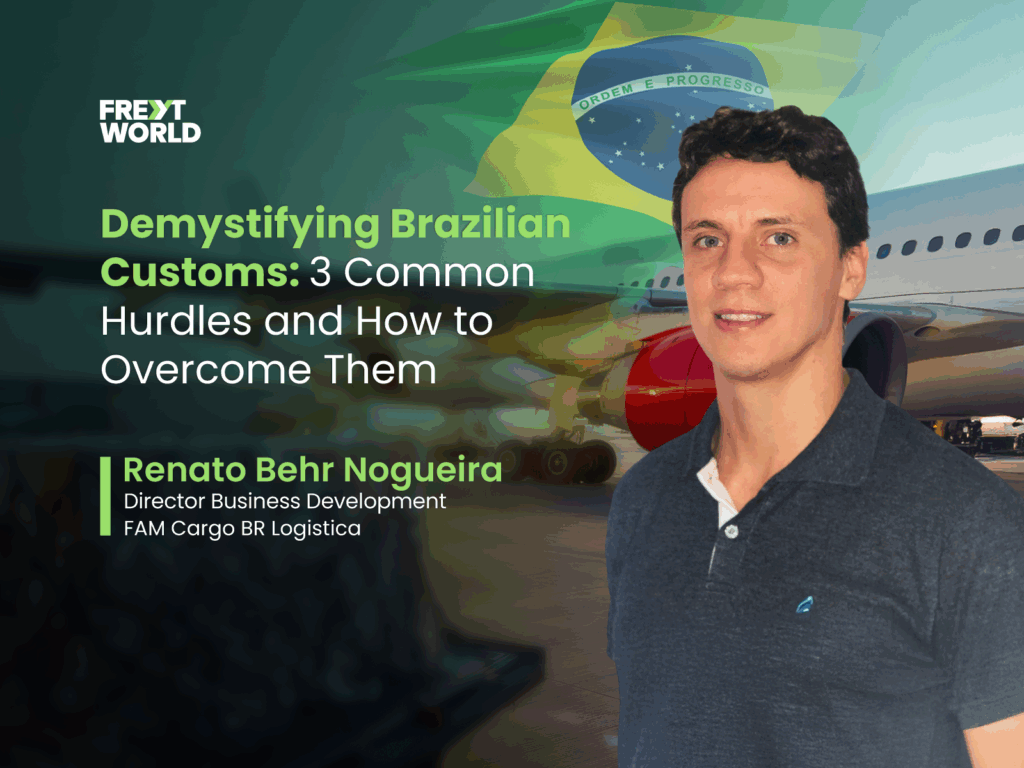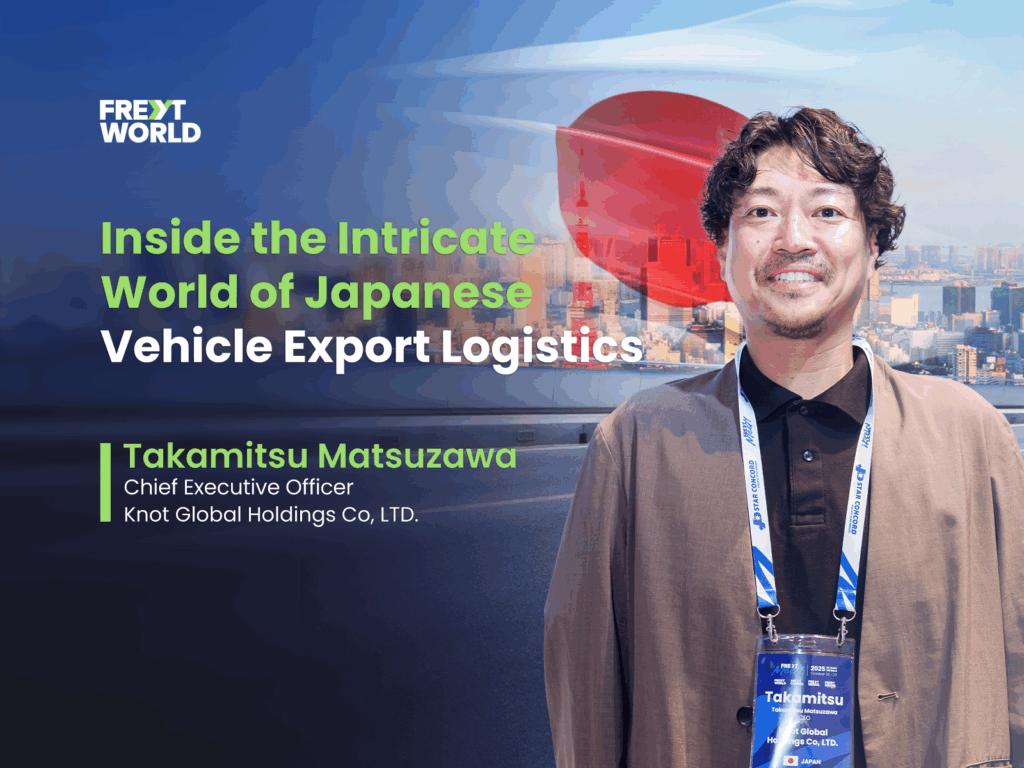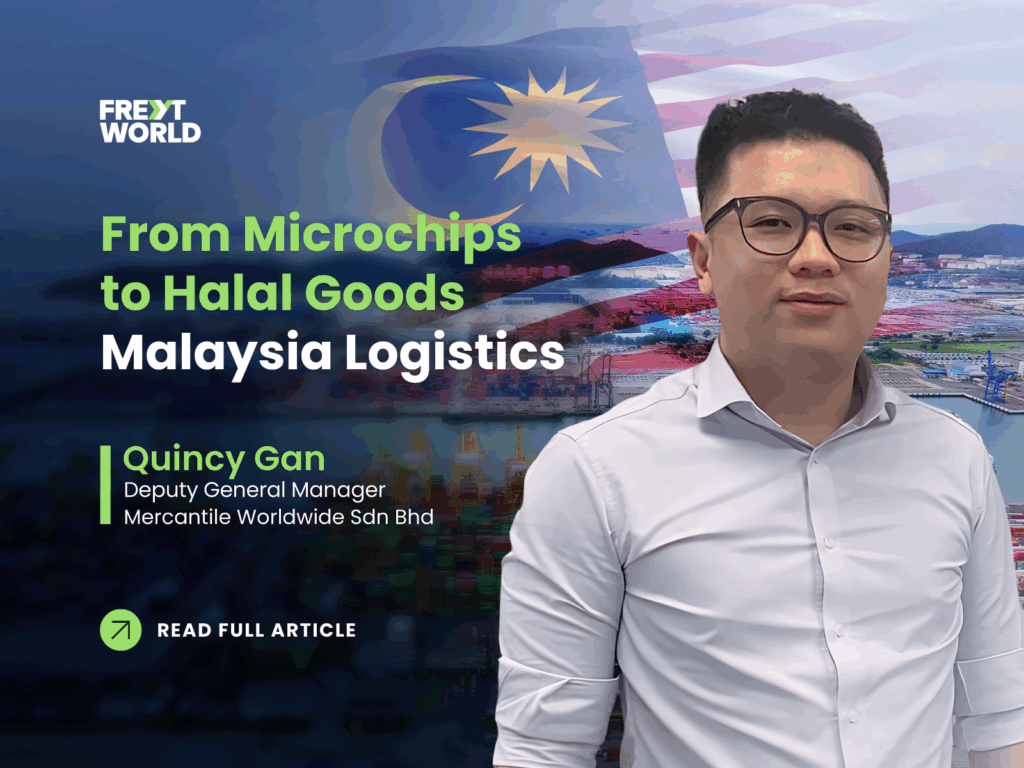By Renato Behr Nogueira, Director Business Development of FAM Cargo BR Logistica

Navigating the complex landscape of international trade can be a daunting task, and few markets present as unique a set of challenges and opportunities as Brazil. With its dynamic economy and vast consumer base, Brazil stands as a beacon for global businesses seeking expansion. However, beneath the surface of immense potential lies a customs system notoriously known for its intricacies. For the uninitiated, this complexity can feel like an impenetrable barrier, transforming what should be a promising venture into a logistical nightmare riddled with costly delays, unexpected fines, and frustratingly stalled shipments. This is where expert guidance becomes not just beneficial, but absolutely essential.
In our ongoing mission to demystify these global trade complexities, we sought insights from a true veteran in the field: Renato Behr Nogueira, the seasoned logistics expert from FAM Cargo BR Logistica. As a proud Freyt World member rooted firmly in Santos and Sao Paulo, Brazil, Renato possesses an unparalleled understanding of the local customs landscape. He graciously shared his expertise, shedding light on three of the most common hurdles faced by businesses venturing into the Brazilian market and, more importantly, offering actionable strategies to overcome them.
The Hurdle: Missing or Incorrect RADAR License – Your Essential Ticket to Trade
Imagine preparing a meticulous presentation, only to realize at the last minute that you’ve forgotten your laptop. This is akin to attempting to import or export goods into Brazil without a valid RADAR license. The “Registro e Rastreamento da Atuação dos Intervenientes Aduaneiros” (RADAR) system is not merely a bureaucratic formality; it is the fundamental prerequisite for any company wishing to engage in trade with Brazil. Despite its critical importance, this step is frequently overlooked by first-time shippers, leading to immediate and often irreversible complications upon cargo arrival.
Renato's Insight: "The RADAR license isn't just paperwork; it's your ticket to trade in Brazil," Renato emphasizes with a calm authority that only years of experience can bring. He elaborates, “The key to successfully navigating this initial hurdle is to be unequivocally proactive. Do not wait until your goods are on the high seas to consider your RADAR registration. Engaging with a local partner well in advance of any shipment is paramount. A knowledgeable local expert can meticulously guide you through the specific requirements tailored to your business, ensuring that your application is submitted correctly and comprehensively. This foresight, this deliberate preparation long before your cargo is even scheduled to ship, is what ultimately prevents your goods from being held indefinitely at the port upon arrival, accruing debilitating demurrage fees and causing untold frustration.”
The process of obtaining a RADAR license involves submitting various documents, including corporate registration papers, financial statements, and a detailed business plan. The Brazilian Federal Revenue Service (Receita Federal) conducts a thorough review to assess the company’s legal and financial standing. Depending on the company’s activity and volume of trade, there are different types of RADAR licenses: Express, Limited, and Unlimited. Each category comes with specific requirements and trade limits. Misclassification or incomplete documentation can lead to significant delays or outright rejection. A local partner's expertise ensures that the correct license type is pursued and all documentation is perfectly aligned with the Brazilian authorities’ exacting standards. This proactive approach saves not only time and money but also protects the integrity of your supply chain and your business reputation.
The Hurdle: Underestimating the Tax Burden – The Hidden Costs that Can Derail Profitability
Brazil’s taxation system is widely recognized as one of the most intricate globally, a veritable labyrinth of federal and state-level duties that can swiftly erode profit margins if not meticulously accounted for. Shippers must contend with a multitude of taxes, including but not limited to the Import Duty (II), the Industrialized Product Tax (IPI), PIS/COFINS contributions (social contributions levied on revenue), and the ever-present state-level Value Added Tax (ICMS). The complexity arises not only from the sheer number of taxes but also from varying rates based on product classification (HS Code), origin, and destination state within Brazil. A miscalculation in any of these areas can drastically impact your bottom line, transforming a seemingly profitable shipment into a financial drain and inevitably leading to protracted customs disputes.
Renato's Insight: “To avoid nasty surprises, accurate forecasting is absolutely essential,” Renato advises, stressing the critical importance of financial precision. “This isn't merely about knowing the rates; it’s about understanding their application in context. An experienced local forwarder possesses the nuanced knowledge required to provide detailed, upfront cost estimates. These estimates are meticulously crafted based on the correct HS Code classification for your specific goods – a detail that, if overlooked or incorrectly applied, can lead to monumental discrepancies. This level of granular detail ensures unparalleled financial transparency and serves as a vital shield, protecting your budget from the unexpected hits that can catastrophically derail a shipment's profitability. Without this foresight, businesses often find themselves in a reactive position, struggling to absorb unforeseen costs that could have been mitigated with proper planning.”
The correct Harmonized System (HS) Code classification is the cornerstone of accurate tax calculation. Brazil has its own version of the HS Code, known as NCM (Nomenclatura Comum do Mercosul), which includes specific national additions. A single digit error in the NCM can lead to a different tax rate, resulting in either underpayment (leading to fines and seizure) or overpayment (tying up capital unnecessarily). Furthermore, certain goods may qualify for tax exemptions or reductions based on trade agreements or specific government incentives. A knowledgeable local partner can identify these opportunities, further optimizing costs. Beyond the direct taxes, shippers must also consider other associated fees like port storage, handling charges, and customs brokerage fees, all of which contribute to the final landed cost. Comprehensive upfront analysis of all these elements is indispensable.
The Hurdle: Minor Documentation Errors, Major Delays – The Devil is in the Details
In the meticulously precise world of Brazilian customs, even the slightest deviation from perfection in documentation can trigger a cascade of problems. Brazilian customs authorities are renowned for their meticulous scrutiny. A minor discrepancy between the Commercial Invoice, the Bill of Lading, and the actual physical cargo – perhaps a slight difference in weight, an imprecise quantity, or even a vague goods description – can be interpreted as a red flag. Such an oversight frequently leads to mandatory physical inspections, protracted bureaucratic delays, and rapidly mounting demurrage and storage fees. What might seem like a negligible error at the origin port can escalate into a time-consuming and expensive ordeal upon arrival in Brazil.
Renato's Insight: “The most critical phase of any shipment to Brazil is the documentation review before it even leaves the origin port,” Renato asserts with unwavering conviction. He continues, drawing upon years of practical wisdom, “We often tell our clients, 'A clean paper trail paves a smooth path through customs.' This isn't merely a catchy phrase; it’s an absolute truth. A single oversight, a misplaced decimal point, or an omitted detail can cost weeks of delays and thousands in unforeseen expenses. Conversely, a thorough, painstaking check costs mere minutes at the outset. This pre-shipment documentation review is where we, as your local partners, truly add invaluable worth. We act as that crucial second pair of eyes, scrutinizing every line, every number, and every description to ensure that every single detail is absolutely perfect, eliminating the risk of costly discrepancies down the line.”
The "clean paper trail" concept extends to all supporting documents, including packing lists, certificates of origin, import licenses for restricted goods, and any other specific permits required for certain commodities. Each document must be consistent with the others, and the information must accurately reflect the physical cargo. For example, a commercial invoice must precisely match the description and quantity on the bill of lading, and both must align with the actual contents of the shipping containers. Furthermore, specific formatting and language requirements often apply. Documents typically need to be in Portuguese or accompanied by certified translations. Failure to comply with these seemingly minor details can result in customs holding the cargo until corrections are made, leading to significant delays and storage charges. Leveraging a local expert for this pre-shipment review effectively offloads this complex burden from the shipper, allowing them to focus on their core business while ensuring compliance.
Your Partner for a Predictable Path: Unlocking Brazil's Potential
Navigating the complexities of Brazilian customs doesn't have to be a source of perpetual anxiety or a roadblock to your international ambitions. While the system is undeniably rigorous and demands meticulous attention to detail, it is also, as Renato wisely points out, fundamentally predictable when approached with the right knowledge, strategic preparation, and, most importantly, the right partnerships.
The true key to unlocking Brazil's vast market potential and transforming its challenges into opportunities lies in forging a strong alliance with a local expert. This isn't just about hiring a service provider; it's about securing a trusted partner who possesses an intimate understanding of the nuances of Brazilian regulations, who can anticipate potential challenges long before they materialize into problems, and who can seamlessly guide your shipments through every phase of the import or export process.

Freyt World Blog Contributor
Freyt World is a global logistics network uniting members from around the world. Our mission is to revolutionize global logistics through collaboration and innovation. Our platform goes beyond networking, enabling members to excel and grow together, featuring articles by logistics professionals for their peers. This series will cover industry-relevant issues and news, providing valuable insights for professionals in the field.


